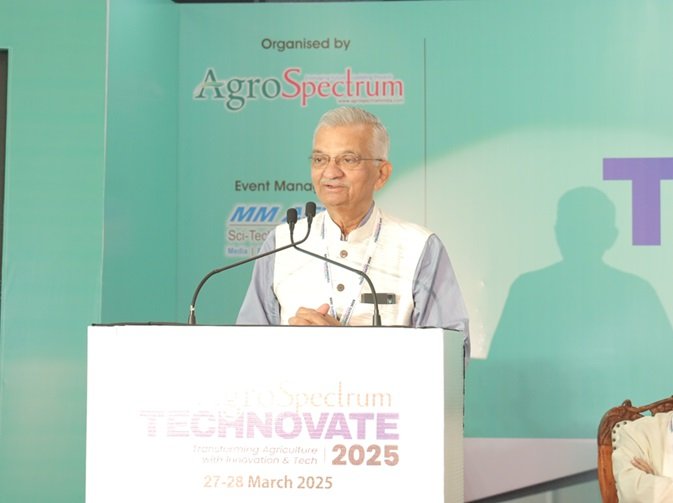Saturday, 31 January 2026

AgroSpectrum Technovate 2025, a premier conference dedicated to exploring the intersection of agriculture and technology, kicked off in Navi Mumbai, today. The two-day event brings together industry leaders, innovators, researchers, and policymakers to discuss and showcase the latest advancements in agritech. With a focus on sustainable practices and cutting-edge technologies, the conference will address the challenges and opportunities facing the agricultural sector in the 21st century
On the inaugural day of the conference, Dr Anil Kakodkar, Ex Chairman, Atomic Energy Commission & Secretary, Atomic Energy, started his ‘Vision Talk’ by mentioning that technology is changing at a very fast pace. Building bridges between technology and agriculture is important. Mentioning climate change and soil degradation, he urged to focus on capacity building at the grassroots level to make farmers understand what the technology is meant for. He mentioned improving the agri economy, however, the growth remains a question mark.
The former Chairman of the Atomic Energy Commission talked about the concept of Cillage, which can be better mentioned as the Best of a City in a Village. A digitally-enabled modern village can be the future of India’s growth in the agri sector. Knowledge-based ecosystems for integrated education, research technology development and deployment, as well as livelihood and capacity building in rural areas, can be a game changer in the long run. Kakodkar opined that agriculture and horticulture products are among the top sectors, along with electricity, coal, steel, etc.
Citing an example about the Gini Index, which is higher in rural areas, Dr Kakodkar raised concerns about its prevalence in urban areas. Also referred to as the Gini coefficient, it provides insights into inequality within a population. A higher Gini index indicates greater inequality, with high-income individuals receiving much larger percentages of the population’s total income. He cited examples of following old data in various reforms, including the agri sector and following these data leads to challenges and validity of the numbers.
According to him, the climate crisis, depleting resources and environmental crisis are taking their toll on the overall growth of the country. He emphasised creating social structure. Economy-led development, tech-led development, and knowledge-led development are driven by research-intensive value creation that could promote welfare through democratisation and decentralisation.
Every village needs to become a net exporter rather than an importer. This will have a good impact on the economy. He emphasised quality education to eliminate disparities that need much larger attention. Dr Kakodkar touched upon migration, which is a matter of worry. City-centric growth is leading to disparities. He said, “If we can talk about working from home, then why not work from villages?”
“India’s economic growth is due to its massive youth,” he observed. In the past, development was led by the economy, then we had tech-led development, value addition through new technology. But today, we should be talking about knowledge-led development.
Research-intensive value creation could promote human welfare. Lastly, he urged to promote a conducive innovation eco-system. Value addition, leveraging local strengths with a global outlook, is the key.